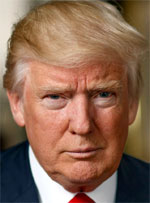

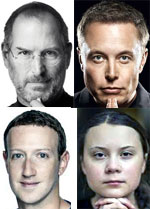 November 4, 2024
November 4, 2024
Generations: Baby Boomers to Gen Alpha
Mapping the Generation Peoplescape
I'm a Baby Boomer. With so many generational names being thrown around describing how they function and shape society, I needed a sense of bearing about this Peoplescape and where I stand in this mosaic. I asked AI and referred to other podcasts.
What Starts a new Generation?
So, who's the big guy who decides when a generation stops and a new one begins? This is actually shaped by historical markers that change the landscape, culture, convention and ways of thinking of the new generation about to be born. This change is a radical departure that creates a great divide from the previous generation. This shift usually happens in intervals of 15 to 18 years.
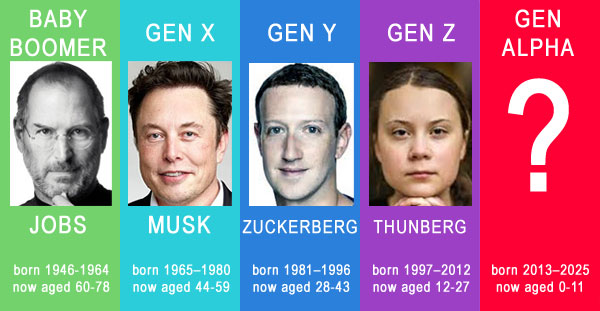
Baby Boomer
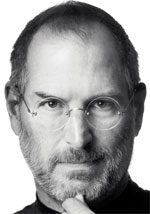


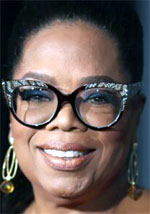

- Genesis - WWII is over and won by the Allied Powers with America as the uncontested global superpower. The GIs who came home made lots and lots of babies - thus the Baby Boomers. These boomers experienced an America rich in access to domestic and global resources.
- Characteristics - Baby Boomers are optimistic, loyal to their employers, idealistic, and work-oriented (their career became part of their identity). Through these virtues, the Great American Dream was within reach.
- Conflicts - When they were young, they were the progenitors of change. Now that they are old, they resist change. They acquire material possessions to a fault. They popularized, "Greed is good". They seem out of touch with the younger people.
Baby Boomers grew up on the crest of economic prosperity and abundance in the land of plenty and opportunities. When they came of age, they became the hippies and stopped the Vietnam War. When they entered the workforce, they became the yuppies and gave new meaning to 'upward mobility'. When they became successful, they gave new meaning to 'çorporate hostile takeovers' - 'greed' became their rallying cry. They traversed the analog world to the digital world, from typewriters to computers, from magazines to desktop publishing. They transformed the workforce and society in ways never seen before. They became the movers and shakers of society, politics and the economy. A boomer's work culture is results-oriented, characterized by loyalty, hard work, and professionalism. They pursued progress with unintended consequences on the environment. Now the younger generation feels the need to repair damage to the environment causing climate change - which they blame on the boomers.
They went through the radical changes of the counter-culture movement, the civil rights movement, the Vietnam War, and the Cold War with the Soviets.
Now that the youngest of them is already 60, a senior citizen, they face a world of health concerns and confront a culture almost unfamiliar to what they have always known. They've struggled with AI, blockchain and cryptocurrencies. Now, they are lost and confused with climate change and emergent social issues like woke Zeitgeist, inclusion, diversity and identity politics.
But they are still relevant. Donald Trump may be the oldest Baby Boomer, but he could still be president - we'll find out tomorrow!
Gen X
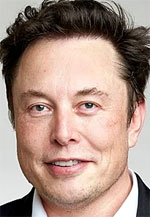
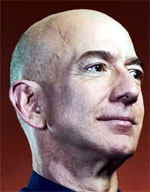



Gen X are the children of the Baby Boomers. They learned from the shortcomings of their parents. They were the "latchkey generation" since they would go home from school having a key to a single-parent household. They would keep busy at home as their parents were still at work. There is a high rate of divorce/separation among the parents of Gen X. Unlike their parents who rode the economic boon, Gen X experienced the economic downturn of the 70s and 80s leading them to be skeptical towards institutions. They have seen the breakthrough of technological advances like the personal computer. They balance their digital life with face-to-face personal interactions (unlike the newer generation who feel disconnected from interpersonal interaction). In today's world however, Gen X bridges the generational gap between the Boomer's analog thinking with the Gen Y's digital thinking - merging the old world with the new world.
- Genesis - after the WWII population explosion which gave rise to the Baby Boomers, birth rate began declining around 1964 which ended the Baby Boomer generation. This paved the way for smaller family units which Gen X came into being. It was a different scene for them. The 70s saw economic downturns - oil crisis, inflation, and an economic recession that limited job growth and employment. This caused Gen X to be skeptical about the institutions and their employers. They embraced self-reliance and pragmatism especially when it came to employment and finance. The 70s saw a surge in divorce resulting in single-parent households which became the Gen X environment. Gen X grew up with personal computers, video games, cable TV and MTV - these all purveyed their influences on Gen X. This enabled them to be early adapters in high tech when they became adults. With the end of the Vietnam War, Watergate, the Cold War, Gen X were skeptical about politics. Their thinking was somewhat molded with the message, "You're on your own".
- Characteristics - independence, skepticism, and innovation to disrupt established industries and conventions. This reflects their distrust to traditional institutions. Conflicts between the Baby Boomers and the Gen Y, Gen X feels like a 'middle child' suffering from neglect.
- Gen X vs Boomers - Gen X is independent while Boomers espouse authority. Gen X are skeptical about the institutions (economic downturns, high divorce, Watergate) while Boomers are idealistic (space race, civil rights). In the workplace, Gen X are overshadowed by the Boomers especially in leadership roles - Gen X feel marginalized. Gen X hop from one job to another looking for greener pastures while Boomers are loyal to employers. Gen X desire a work-life balance while Boomers work themselves to death in the name of upward mobility. Gen X grew up with the personal computer while Boomers caught the tail-end of it. Boomers could be tech-reluctant while Gen X find it a way of life.
- Gen X vs Gen Y (millennials) - Gen X are independent and take agency (having fended to themselves as the latchkey generation) while Millennials work through collaboration. Gen X are skeptical and cynical, often viewing Millennials as naive or too optimistic while Millennials are idealistic and go for a purpose-driven work. Gen X don't care too much for social activism whereas Millennials are open and vocal about social issues. At the workplace, Gen X simply want to get the job done (Gen X Elon fired 80% of Millenial-Twitter employees because Elon thought they were pussies) while Millennials want work-at-home and massage days. Gen X learned to adapt to changing fortunes in the workplace - Millennials took job security seriously after the 2008 market meltdown while they serviced their student loans. Gen X is tough and they feel Millennials are entitled.
Gen Y: Millennials





- Genesis - Millennials came into a world with the internet, social media platforms, and smartphones. They were the digital natives who lived with technology and adapted readily and easily to technological breakthroughs. Twitter, MySpace, Facebook, Instagram were central in how Millennials communicated, formed relationships and shaped their identity - it amplified their voice to a global audience. Hanging out with friends was replaced by Chats in the messaging apps. They were more tech-savvy than their parents, the Gen X.
Millennials entered the workforce during the Great Recession of '77-'79 - prospects were bleak and wages were stagnant. Soaring educational costs caused a student debt crisis resulting in delaying milestones like marriage, home ownership and family life. This fueled the growth of the Gig Economy, freelancing and startups - this meant flexibility but less security and fewer benefits. 9/11, Iraq War and the financial crisis made Millennials skeptical about government and authority. They aligned themselves to companies with the same social values. They championed diversity (race, ethnicity, gender, age, sexual orientation, religion), equality (access to the same opportunities, rights and resources) and inclusion (creating a supportive culture that welcome, respect and value all stakeholders). Think Twitter (before Elon purchased it). - Characteristics - Millennials are highly social and highly educated. They embrace technology and global connectivity, pursue purpose-driven work, strive for social justice, activism, inclusivity and diversity. Unlike the Baby Boomers, Millennials value experience more than material possession
- Conflicts - Millennials are too focused on instant gratification. They are not loyal to employers and will hop from one job to another in search of resonance and meaning. They struggle with mental issues due to social comparison on social media, high student debt and economic instability.
- Boomers vs Millennials - with a generation gap, there is a wide difference between Boomers and Millennials. Boomers love their work and delay retirement causing a long wait for Millennials to move up. Boomers are driven by ambition at all costs while Millennials would rather have a work-life balance and meaningfulness in their careers. Boomers see Millennials as unloyal and un-resilient. Millennials see Boomers as tech-averse and reluctant to change.
- Gen X vs Millennials - both can live harmoniously having shared economic downturns that shaped their worldview (80s recession with the Boomers and 2008 financial crisis for the Millennials). Gen X values privacy and autonomy while Millennials are collaborative and more tech-savvy.
- Gen Z vs Millennials - both share social justice and DEI values, both are tech-savvy but Millennials were active in the early internet while Gen Z are full-on with today's online culture. Millennials are collaborative and social in their use of technology while Gen Z go for rapid online content consumption (like TikTok). Both struggle with mental health issues. Millennials often serve as mentors to Gen Z in the workplace.
Gen Z





- Genesis - the aftermath of 9/11 and the ongoing War on Terror was the landscape when Gen Z came into being. This developed their global awareness and safety concerns. Social media (Facebook, Youtube, Instagram) were ubiquitous to the Gen Z - they were tech-savvy on the digital space. They became the social influencers, building their online brand and monetizing on social media. The Great Recession (2008-2009, subprime market meltdown) adversely affected their view on debt, education, home ownership and the trustworthiness of the financial institutions - they saw their parents go through that ordeal. They valued financial stability. Climate change and environmental concerns prompt them to value sustainability, favor eco-friendly products and companies. Gen Z grew up with compelling social issues like Black Lives Matter, Me Too and LGBTQ, making them socially aware and vocal. Gen Z saw the emergence of AI and automation and saw how machine can take over humans - this impacted on their career choices. As young adults, they experienced Covid that changed their way of learning (remotely from home), of mandatory vaccination and distrust of the mainstream (post-Covid when whistleblowers came out of the woodwork).
- Characteristics - Gen Z are the first fully digital generation being exposed to technology at a very early age. They are extremely savvy with social media and content creation. Like the Millennials, they practice DEI (diverse, equal and inclusive). They are pro environment (think Greta Thunberg) and socially conscious. Learning from the Millennials' struggle with debt and the economy, Gen Z value job security and stability. Gen Z possess digital fluency and are commitment to activism.
- Conflicts - like the Millennials, they suffer from mental issues due to social media exposure and pressure to perform online. Gen Z suffer from short attention span and favor quick consumable content (like TikTok). They suffer from in-person face-to-face interaction due to extreme exposure to online communication.
Gen A: Generation Alpha
The oldest Gen A now is still 11 years old. It is still unclear how they will shape and move society since they still have to make their mark. It is clear however, that they are raised seamlessly woven with technology and social media from birth. This gives promise of a radical change in how social media is consumed and developed as they come of age.
- Genesis - 2013 was a dividing line between Gen Z to Gen A due to technological and cultural shifts. Gen A grew up with iPhone, iPad, Alexa, virtual/augmented reality and other smart devices - these became fully integrated into their landscape and became essential daily tools in their day-to-day. This interaction is way beyond Gen Z experience (who can still remember dial-up internet, basic cell phones, and the rise of social media platforms). Gen A is the truly digital-first generation. Gen A are largely children of the Millennials (not Gen Z) who were very comfortable with technology (think Elon Musk) and new ways of learning. 2013 saw increased awareness in climate change, racial equality and political discourse (neocons, retcon, etc) - these become open topic in dinner conversation. Covid forced Gen A to learn remotely in virtual classrooms.
As they come of age, AI plays a crucial role in enhancing and personalizing their learning (adaptive learning software, tutorial apps, AI-led study aids), giving them real-time feedback. Education supplements can take the form of pretend-play apps that actually foster learning. Gen A will play with AI-powered robots and other highly interactive devices. Gen A will be consuming AI-generated content. Algorithms will be tailor-fitted to Gen A's personalized learning needs. Digital friends could be a permanent fixture in Gen A's social sphere, blurring the line between a personal friend and a digital friend. Voice-activated AI personal assistants are the norm. The job market will require AI-literacy for eligibility. Learning and entertainment are largely augmented by AI. - Characteristics - they are digitally fluent as they grow up in a world of AI, smart devices and virtual/augmented reality. They are shaped by issues on climate change and social justice. They are predicted to be the most educated with personalized and tech-driven learning. They will be adept at multi-platform engagement. They will have a highly collaborative global mindset.
- Conflicts - their high dependence on technology may limit their real world interpersonal skills. Like the generations before them, they may suffer from mental issues due to their disconnection with the real world. With AI seamlessly woven into their way of life, Gen A might be impaired to solve problems independently or be impaired to develop intimacy with real people. Critical thinking and attention spans may also take a back seat to AI and other technological prompts.
Ending Thoughts
I did this research curious how the landscape looks like given the many generational waves that were shaped by global events, compelling social issues, political shifts and economic turns. Sure, I found my bearing, but more importantly, I also stumbled upon some unintended realizations. I am a Baby Boomer but unlike the boomers I know of who were left behind by the times, I somehow see myself still a contender with the current Zeitgeist. I am as present now with the times as I have always been since my younger days. Unlike my Dad who gave up when computers came about and now find an increasingly unfamiliar and alien world he could no longer come to terms with, I'm well aware of what's happening in the political scene (that the US presidential election is practically an existential threat to the losing party), I use the Blockchain and support my day-to-day needs through cryptocurrency, I am strong beyond my years and continue to be resilient from any disease due to my yoga practice, I don't suffer from the mental issues plaguing the younger people.
--- Gigit (TheLoneRider)
YOGA by Gigit ![]() |
Learn English
|
Learn English ![]() |
Travel like a Nomad
|
Travel like a Nomad ![]() |
Donation Bank
|
Donation Bank ![]()
Leave a comment?
Next Peoplescape story:

![]()
![]()
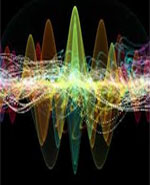
![]()
![]()
Quantum Field Theory
(November 13, 2024) As I was watching a podcast between Sir Roger Penrose and Federico Faggin about Quantum Physics and consciousness, a few words were bounced around - quantum field, wave function collapse, Special Relativity and quantum gravity. I have a vague sense of what they are, but to pin them down? I had to ask AI and embark on a new learning curve about the quantum realm....more »»
»» back to Peoplescape
»» back to Learning
»» back to Homepage
ARCHIVE 2025:
JAN |
FEB |
MAR
1970 |
1973 |
1975 |
1976 |
1977 |
1979 |
1981 |
1996 |
2000 |
2001 |
2002 |
2003 |
2004 |
2005 |
2006 |
2007 |
2008 |
2009 |
2010 |
2011 |
2012 |
2013 |
2014 |
2015 |
2016 |
2017 |
2018 |
2019 |
2020 |
2021 |
2022 |
2023 |
2024 |
2025 |
ALL BLOGS
